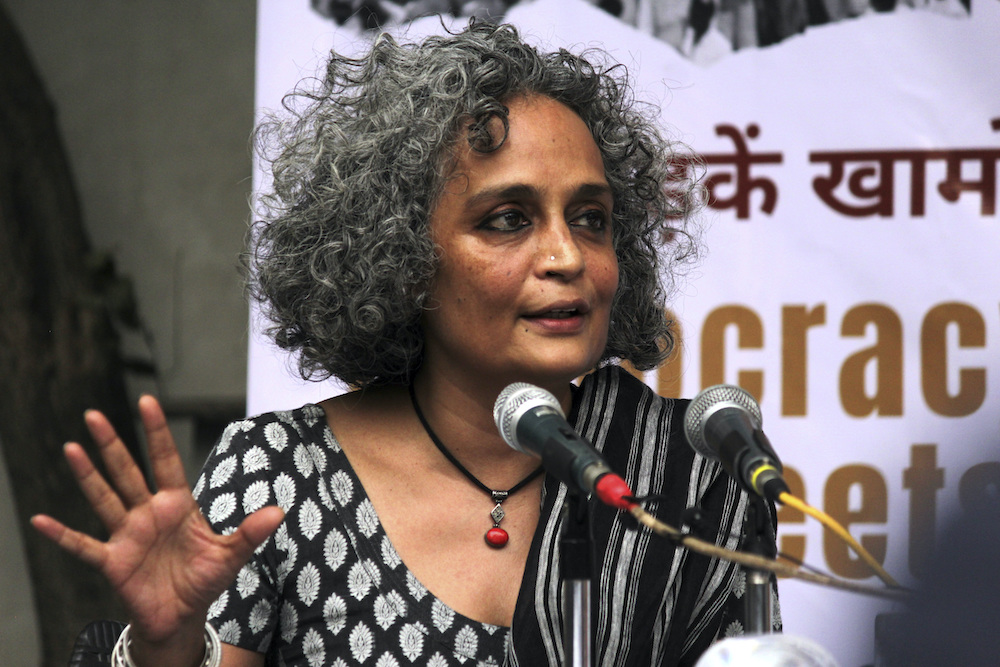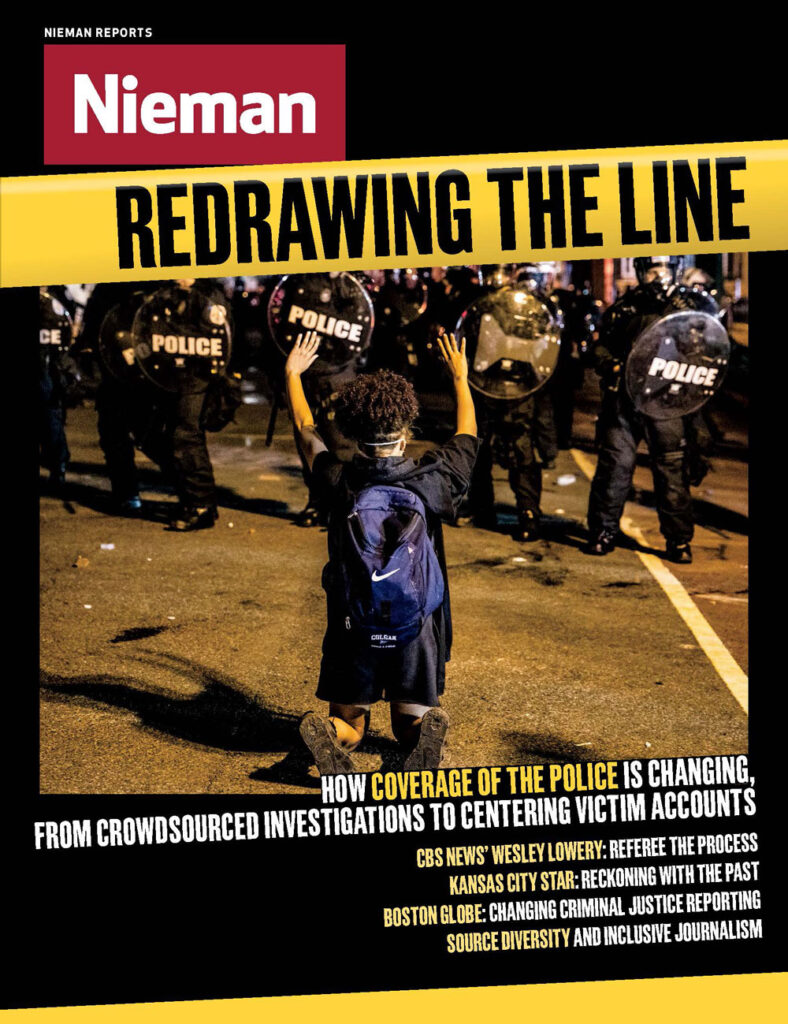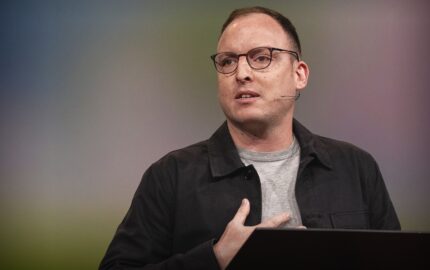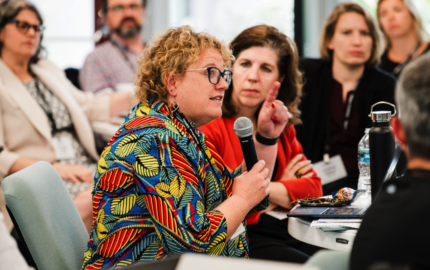Arundhati Roy’s first novel, “The God of Small Things,” won the Man Booker Prize in 1997. Her second, “The Ministry of Utmost Happiness,” was shortlisted for it. These books, written two decades apart, capture how India has changed. In addition to her fiction, though, Roy’s political essays taught a generation of young Indian writers to think incendiary thoughts. Her recent New Yorker profile says her essays on India’s nuclear policies are not so much written as breathed out in a stream of fire.
Years of increasing repression towards journalists from Indian Prime Minister Narendra Modi’s government have come to a head in recent weeks, as the country is roiled by the ongoing farmers’ protest against three farm bills passed in September 2020. Numerous journalists reporting on the protests have faced criminal charges and, in early February, some 100 journalists, publications, and activists were temporarily blocked by Twitter at the request of India’s Ministry and Electronics and Information Technology.
At a time when democratic values are under siege in her home country of India, as they are elsewhere around the world, including in the U.S., Roy’s analysis of issues like nuclear weapons, industrialization, nationalism, and more is essential to this moment. She is unapologetic about the stakes. Once, when a historian criticized her for passionate rhetoric, she responded, “I am hysterical. I’m screaming from the bloody rooftops … I want to wake the neighbors. That’s my whole point. I want everybody to open their eyes.”
Roy’s work has been translated into more than 45 languages and, in 2019, her nonfiction was collected in a single volume, “My Seditious Heart.” A new collection of essays, “Azadi: Freedom. Fascism. Fiction.” was published last year. Roy spoke with the Nieman Foundation and shared her thoughts with Nieman Reports in February. Edited excerpts:
On whether India can still be called a democracy
Of course not. Apart from the laws that exist, like the Unlawful Activities (Prevention) Act [1967 anti-terrorism legislation to prevent unlawful activities and associations and “maintain the sovereignty and integrity of India”], under which you have hundreds of people now just being picked up and put into jail every day, apart from that fact, every institution that is meant to work as a check against unaccountable power is seriously compromised.
Also, the elections are compromised. I don’t think we have free and fair elections because you have a system now of secret electoral bonds, which allows business corporations to secretly fund political parties. We have today a party that is the richest political party in the world, the BJP. Elections in India have become a spectator sport — it’s like watching a Ferrari racing a few old bicycles.
In any case, a democracy doesn’t mean just elections. First of all, India hasn’t been a democracy in Kashmir. It hasn't been a democracy in Bastar [a district in the state of Chhattisgarh in central India]. It hasn’t been a democracy for the poorest of the poor who have no access to institutions of justice, who live completely under the boot of police and the justice system that crushes them with violence and indifference.
Now the oxygen is being taken away, sucked out of the lungs of even the middle class and even the big farmers, the agricultural elite.
On violence against women and Dalit and Muslim citizens, including lynchings of minorities by Hindu nationalist mobs
The thing is that when it comes to women, the fact that the caste system exists has meant that dominant castes in many many villages in India still feel that they have the right to oppressed caste woman’s body. That is how it has been traditionally.
This is why in India only certain rapes create outrage, whereas others are accepted as part of how things go. Look at what has happens to women in the northeastern states—Manipur for example, or women in Kashmir. Places that are literally administered by the security forces. You can imagine what goes on with that kind of imbalance of power. But the outrage doesn’t manifest itself on India’s streets. So you’re left wondering which rapes are considered outrageous in a society like this, and which are not.
When people feel that they have a license to lynch — permission from the top, then the reasons for lynching are not just to keep a community in fear. A whole ecosystem of fear kicks in, and not just fear, bullying, avarice — how one set of people can gain advantage over another — by frightening them , chasing them away from their land, from their villages. There’s a kind of lynching economy also that establishes itself through all this. We live in an age of mini-massacres. Very atomized, localized. You don’t need the old-style mega massacres like Gujarat 2002 or Mumbai 1993 any more.
The most dangerous thing that has happened is that, [as] the last few elections have shown, the BJP has proved that it can win elections without the Muslim vote. That creates a situation, where you have a minority which actually is made up of millions of people who are virtually disenfranchised. That’s a very, very dangerous situation.
On the role the media has played in the decline of India’s democracy
None of this could have happened if it wasn’t the media. Here you see the confluence of corporate money, corporate advertisement, and this vicious nationalism. You can’t even call them media or journalists anymore. It would be wrong.
The only [legitimate] media that there is now is a few people who are online who are managing very bravely to carry on and a few magazines like Caravan. I was recently listening to a very moving talk by this young journalist called Mandeep Punia who had just been arrested and beaten up. He was talking about how so many of his fellow journalists cannot be called journalists any more.
They’re just people who act out a script every day. If you look at the media, the police — I’m sorry to say this, but it’s almost diseased. I keep joking that I can’t put on the TV in my house because it feels like that girl in “The Exorcist,” this green bile pouring forth from the TV screen and spilling onto the floor. I feel like I need to clean it up. I don’t put it on anymore.
[Politicians such as] Prime Minister Narendra Modi, and Minister of Home Affairs Amit Shah, none of them would be anything but just some small‑time hoods on the street if it wasn’t for the media, I’d say. They have been built up and amplified by this unbelievable invasive, relentless propaganda machine.
On the role of the writer or the artist in democracies in crisis
I often think that writers are no different from plumbers or carpenters. Some service the fascists. Some service the others. It’s not that writers are in any way politically better people. You see plenty of writers completely being part of this Hindu fascist project.
It’s been a question that’s very interesting to me for as long as I’ve ever been a writer. During the Freedom struggle against the British it was easy to delineate the battle., “The colonizer’s bad and they’re white. The freedom fighters are local, and they’re brown.” There’s a way in which passions could be comparatively at least, clear. Now, it’s all so murky. The river’s full of mud and silt.
To me, it’s always been the case that I feel like you need to have eyes around your head. For example, if you look at what’s happening with the farm protests now, how do you understand it, as a writer or as a human being? The government is under pressure because it’s the first time they’re faced with people who have not necessarily always been their ideological opponent. It’s hard to portray farmers as terrorists and anti-nationals, though God knows they’ve tried.
The agriculture crisis is a real crisis. It wasn’t created by Hindu fundamentalism. It was created by the Green Revolution when capital-intensive farming was introduced. It was created by the over‑mining of water, by the over-use of pesticides, by hybrid seeds, by putting in massive irrigation projects and not thinking about how to drain the water. So how do I make literature out of irrigation problems, or drainage, or electricity?
It’s been something that I’ve been pretty obsessed with, understanding things which are not normally considered a fiction writer’s business. To me, I can’t write fiction unless I make it my business.You have to know how all these things intersect with each other. How does caste, or race, or class, or irrigation, or bore-wells affect what might seem like a clash between two communities? How does the harnessing of rivers in Kashmir affect that conflict?
On the writing process
I am a structure nerd myself. A lot of it does have to do with the fact that I studied architecture, the fact that I am very and always have been very interested in cities and how they are structured and how they work, and how institutions in the city are built for citizens, and the non‑citizens live in the cracks.
To me, if you look at my fiction or the non‑fiction, even almost every non‑fiction essay, it is a story. It seems to be the only way I can explain things to myself. There is a mathematics to the way the structure works. In fiction, to me, the structure and the language is as important as the story or the characters.
I don’t think I’m capable of writing something from A to B. It has to take a walk around the park, and then come back to certain places, and then have these reference points. Whether it’s “The God of Small Things” or “The Ministry of Utmost Happiness,” structure’s everything.
On the dangers to journalists, intellectuals, and activists in India
The thing is, what we first have to understand is how ordinary people — ordinary villagers, indigenous people, women guerillas who’ve been fighting mining corporations, people whose names we don’t know — have been dragged into prison, have been humiliated, even sexually humiliated. Those who have humiliated them have been given bravery awards. Look at the number who have been imprisoned, executed, buried in mass graves in Kashmir. All that violence that many Indians have accepted quite comfortably, even approved of, has now arrived at their doorsteps.
When you’re a journalist, a writer, anybody whose head is above the water, you’re already privileged in terms of someone’s looking out for you. You have a lawyer. Meanwhile, we have thousands of people who are in prison who don’t have any access to legal help, nothing.
Then you have a situation where, I’d say, the best of the best — I mean journalists, trade unionists, lawyers who defend them — are in jail. We know a lot of them are in jail for entirely made‑up reasons. There are students in jail. The latest police trick is to make a charge-sheet that is 17,000 pages, 30,000 pages. You’d need a whole bloody library shelf in your prison cell to accommodate your own charge-sheet.
A lawyer or a judge can’t even read it, let alone adjudicate upon it, for years maybe. They are continuously arresting people, or threatening people with arrest. The harassment, even if you are not actually in prison is unbelievable. Your life comes to a standstill. And once people are jailed then the ones who aren’t spend all their time running to lawyers, attending court hearings…The other trick is to have non-internet trolls file cases against you in many cities and towns. Then you spend your time running around. Who can afford it? Who can hold a job if they have to worry about court appearances?
This kinds of harassment flourishes because institutions in India are dominated by Hindutva apparatchiks, it’s really, really worrying. Of course, now, there seems to be a pretty focused attack on women, young women, women activists.
The Chief Justice recently said, “Why are women being kept in the protests?” He’s talking about women who are the backbone of the farming world. Why are they being “kept” in protests?
On the role of tech platforms
Initially, when the 2002 Gujarat pogrom [in which a Godhra train burning that killed nearly 60 Hindu pilgrims incited three days of inter-communal violence in the western state of Gujarat, resulting in more than 1,000 deaths] happened, in fact, for a whole set of reasons, Narendra Modi was banned from travelling to the U.S. A lot of activist groups had successfully campaigned to have him banned. When he became prime minister, that ban was removed.
As I said, at that time, India was at the time a very attractive finance destination. Today, that’s less true but then India is seen as the region that is going to be the bulwark against China and Chinese expansionism. So it’s going to be given a broad pass for these strategic reasons.
The role of big tech is interesting because from 2014 and pre‑2014, let’s say a few years before that, right up to now, the Hindu nationalists had figured out how to use social media to their advantage. You have these things called WhatsApp farms. You have trolls. You have disinformation and lies. All of it spreading like a bushfire.
But recently, you see that the other side has begun to gear up and fight back. Now, there’s a lot of tension on social media and the fact is that, in Kashmir, when 370 was abrogated [revoking the limited autonomy, or “special status,” of the Jammu and Kashmir region], you had an Internet ban that lasted for months and months. The Internet has been banned on the borders of Delhi. The Internet has been banned all over the place.
It should be considered a human rights violation, legally and properly. A crime against humanity actually — if you look closely at the consequences of an almost year-long ban. You cannot, on the one hand, push the entire country into digital transactions, unique IDs, Aadhar cards, iris scans, and then ban the Internet.
You have that situation right now where all of us are being pushed into some form of radical digital transparency, while the only thing that’s opaque is how elections are funded and how political parties make their money and keep their money secret.
On what gives hope
I’m not that fairy princess who’s going to hold out this false hope. I have days of utter desolation and hopelessness, of course I do, like millions of others here. But the fact is that when we develop a way of thinking and a way of seeing, we end up, many of us, certainly me, being people who know that we’ve got to do what we have to do. Whether we win or lose, we’re going to do it because we’re never going to go over to the other side.
You’ve got to keep holding on to that, because that is what puts the oxygen in our lungs, that way of thinking, that way of writing, that way of not aggrandizing yourself to an extent where you think you can solve all the world’s problems. You can’t, but you can do something. And so you just keep doing that something.
In the most stressful situations, whether it’s in the forest where I spent some time with the armed guerrillas in Bastar, or whether it’s friends in Kashmir, or whether it’s in the deepest, darkest places, there’s always humanity. There’s always humor. There’s always literature. There’s always music. There’s always something beautiful.
That’s life. There isn’t ever going to be an end to the chaos. Everything is never going to work out just fine. It’s not going to happen. But we have to be able to accommodate that chaos in our minds and be part of it, swim with it, absorb it, influence it, turn it to our purpose. The wind will change direction at some point, won’t it?




